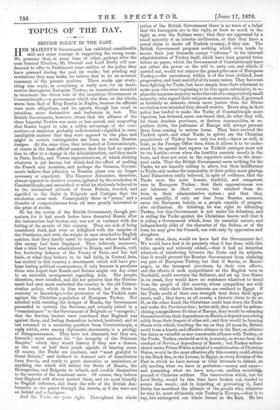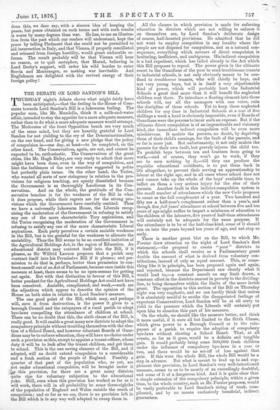TOPICS OF THE DAY.
BRITISH POLICY IN THE EAST.
HERMAJESTY'S Government has exhibited considerable skill and some courage in supporting the wrong cause. We presume that, at some time or other, perhaps after the next General Election, Mr. Disraeli and Lord Derby will con- descend to offer to Parliament some outline of the policy they have pursued during the past six weeks ; but pending any revelations they may make, we believe that to be an accurate summary of the present position. Three weeks ago every- thing was ready, as everything is ready now, for an insur- rection throughout European Turkey, an insurrection intended to terminate the direct rule of the iniquitous Government at Constantinople,—a government which was then, on the whole, worse than that of Sing Bomba in Naples, because its officials were more ubiquitous, and its agents, though less cruel in intention, more destructive and barbarous in fact. The British Government, however, aware that the alliance of the three Imperial Pow.ers was more or less unreal, and suspecting that Russia hoped to take a selfish advantage of the com- motion—a suspicion probably well-founded—signified in some intelligible manner that they were opposed to the plan, and might in certain contingencies use force to resist Russian designs. At the same time, they intimated at Constantinople, of course in the least official manner, that they had no opposi- tion to offer to a change in the Administration; and they made in Paris, Berlin, and Vienna representations, of which nothing whatever is yet known, but which had the effect of making the French and Austrian, and perhaps the German, Govern- ments believe that adhesion to Russian plans was no longer necessary or expedient. The Emperor Alexander, therefore, always opposed to decisive courses, agitated by the revolution in Constantinople, and astonished at what he obviously believed to be the determined attitude of Great Britain, receded, and signified to the Serbs in Belgrade and Cettigne that the revolution must wait. Consequently there is "peace," and a thunder of congratulations from all men greatly interested in the price of stocks.
So far the action of the British Government, though pre- mature, for it had much better have thwarted Russia after the insurrection had broken out, was not at variance with the feeling of the people of this country. They are sick of being considered dead, and were so delighted with the surprise of the Continent, and with the weight at once attached to English opinion, that they hardly cared to inquire on whose behalf all this energy had been displayed. They believed, moreover, that a blow had been administered to Russia, and Russia, with her hectoring defiance of the Treaty of Paris, and her bad faith, or what they believe to be bad faith, in Central Asia, has excited in this country a resentment which will have per- haps lasting political consequences, if only because it paralyses those who hoped that Russia and Britain might one day come to an amicable arrangement regarding Asia. The people, therefore, were satisfied, and did not perceive that the Govern- ment had once more embarked the country in the old Palmer- stonian policy, which in him was honest, but in them is contrary to knowledge,—the protection of the Turkish caste against the Christian population of European Turkey. Not satisfied with resisting the designs of Russia, the Government proceeded to restrain the Servians, and actually joined in a "remonstrance" to the Government of Belgrade so "energetic," that the Servian leaders were convinced that England was against them, and feeling themselves isolated, hesitated, and at last returned to a menacing question from Constantinople, a reply which, even among diplomatic documents, is a prodigy of disingenuousness. They have not disarmed, but they are, forsooth 1 most anxious for " the integrity of the Ottoman Empire," which they would destroy if they saw a chance, at the cost of half their youth capable of bearing arms. Of course, the Turks are exultant, and " most grateful to Great Britain," and inclined to demand acts of humiliation from Servia, and ready to grant amnesties or armistices, or anything else which will induce the Serbs of Bosnia, the Herzegovina, and Bulgaria to submit, and confide themselves to the mercies of the dominant caste. Of course, they believe that England will always protect them, and are most friendly to English influence, and cheer the wife of the British Am- bassador as she passes through the streets, as if she were not an Infidel and a foreigner.
And the Turks are quite right. Throughout the whole action of the British Government there is no trace of a belief that the Insurgents are in the right, at least as much in the right as ever the Italians were ; that they are oppressed by a small minority of an inferior civilisation, or that they have a moral claim to shake off Turkish tyranny, if they can. The British Government proposes nothing which even tends to secure their just demands, except " reforms" in the internal, administration of Turkey itself, which have been granted twice before on paper, which the Government of Constantinople have- not either the power or the will to carry out, and which, if carried out, would not remove the grand grievance of European Turkey,—the ascendency within it of the least civilised, least progressive, and least merciful of its many castes. They have not been fighting for Turks, but have simply done their uttermost to make men who were beginning to be free again submissive, to re- place the immense majority under the rule of a comparatively small minority, who regard their subjects as creatures who, if governed as leniently as animals, obtain more justice than the Divine revelation ever intended they should receive. Every step in their policy has tended to make the Turks of Constantinople more vigorous, less fettered, more convinced that, do what they will, let them desolate provinces, or destroy communities, or re- pudiate debts, the jealousies of Europe will always prevent them from coming to serious harm. They have revived the Turkish spirit, and what Turks in spirits are the Christian populations of Turkey know only too well,—know as well, at least, as the Foreign Office does, when it allows it to be under- stood by its agents that reports on Turkish outrages must not be too hostile—even when the hostility consists merely in the facts, and does not exist in the reporter's mind—to the domi- nant caste. That the British Government cares nothing for the Turks, we are heartily willing to allow, but their indifference- to Turks only makes the immorality of their policy more glaring. Lord Palmerston really believed, in spite of evidence, that the- Turks were the most honest, truthful, and competent race in European Turkey ; that their oppressiveness was not inherent in their nature, but resulted from de- fects in their administrative system ; and that they would speedily, if only set free from Russian menaces, enter the European family, as a people capable of progres- sive civilisation. So thinking, he was right in defending Turkey, but this Government is not under his delusions, and in aiding the Turks against the Christians knows well that it is aiding a Government which, from its essential nature, and independently alike of the character of the Sultan, or of the form he may give his Council, can rule only by oppression and slaughter.
But what, then, would we have had the Government do t We would have had it do precisely what it has done, with this rider, openly and seriously added,—that it had no intention whatever of interfering between the Porte and its subjects, that it would prevent the Russian Government from claiming any part of European Turkey, but that if Berrie, or Monte- negro, or the insurgent provinces, by their own efforts, and the efforts of such sympathisers as the English were to Garibaldi, could overturn the Sultanet, and set up free States in its stead, they would have no resistance whatever to dread' from the people of this country, whose sympathies are with freedom, while their direct interests are confined to Egypt. If the Turks could of their own strength beat down their oppo- nents, well ; they have, at all events, a historic claim to do so. If, on the other hand, the Christians could beat down the Turks- and make the Provinces free ; better still, they would be enfran- chising a magnificent division of Europe, they would be releasing themselves from their dependence on Russia, a dependence arising solely from their despair of other aid ; and they would be forming- States with which, touching the sea as they all must do, Britain could form a hearty and effective alliance in the East, an alliance ten times as valuable as any conceivable alliance with Turkey, or the Turks. Turkey, enslaved as it is, is merely, as we see from the conduct of Servia, a dependency of Russia ; but Turkey enfran- chised under Prince Nikita as head of a confederation of Christian States, would be the most effective ally this country could obtain in the Black Sea, in the Levant, in Egypt, in every division of the East in which we have serious or vital interests to defend, an ally needing what we have in profusion—money and arms— and possessing what we have not,—an endless recruiti4 ground of Christian soldiers. The insurrection which, but for Lord Derby, would by this time have broken out, tended to secure this result; and in impeding or preventing it, Lord Derby has sacrificed the affiance of the people who, whatever he may do, must ultimately rule Turkey in Europe,—that is to say, has endangered our whole future in the East. He has done this, we dare say, with a sincere idea of keeping the peace, but peace obtained on such terms and with such results is worse by many degrees than war. He has, to use an illustra- tion from the past which our readers will understand, kept the peace by telling Piedmont that she could not be permitted to aid insurrection in Italy, and that Vienna, if properly conciliated and released from foreign hostility, would grant endurable re- forms. The result probably will be that Vienna will hear no reason, or to quit metaphor, that Murad, believing in Lord Derby's support, will order his wild hordes to enter Servia and Montenegro, so making war inevitable. And Englishmen are delighted with the revived energy of their foreign policy !



































 Previous page
Previous page